I had just finished my day's shift, parked my taxi in the car park behind the main bus station and walked over the road to my old red Golf, when I saw him. It hadn't been a particularly exciting day - my last customer that night was a pregnant French woman and her husband (well, I assumed it was her husband, but you never know with foreigners), who were in a real hurry to get to the Kosheva hospital. Earlier in the morning there was a friendly Korean lady, who wanted a ride to the Jewish Museum - I asked her if she was Jewish. "No" she said, "I'm meeting a German there." - I was confused. Otherwise it was just the usual crowds of businessmen, locals and tourists with cameras. So since the last bus with potential customers had arrived at the bus station about half an hour ago, the last bus out (to Novi Pazar) had also just left and it looked like the whole place was about to close - it was five past ten - I decided to call it a day.
But just as I got into my little Golf I noticed him - he was wandering out of the bus station only wearing a jumper, slightly bent forward under the weight of his backpack and his breath was white in the cold evening. He was blond with a lot of rather undefined facial hair and wore the kind of trousers only 'travellers' wear - beige fine cord, with knee-high pockets on either side - the heavy hiking/allroad shoes also gave it away. His aimless steps came to a halt, he slowly turned 360 degrees, then trodded on - without any particular direction and a little distraught it seemed.
'Smells like business' I thought.
__________________________I couldn't help cursing myself, although the very opportunistic part of me that always justifies every defeat or mishappening as having some sort of purpose and meaning had already come up with a good solution to this one - it would give me a day to relax and finish those two books I was reading, to finally look after my blog a little more and write my travel diary. But still - I had missed the bus to my next destination (Pristina via Novi Pazar) by barely five minutes. Now I was standing in the cold night outside the bus station, hot because I'd been running with that massive thing on my back, which sure makes me look like a humpback. When I ran into the station and wildly rattled at the doors to the platform, I noticed the guy behind the glass on the left was packing up his stuff. He looked up at me:
"Where you go?" he asked.
"Novi Pazar" I shouted with some urgency.
"It just leave. Come tomorrow."
FUCK!!!! YOU IDIOT!!! I thought. And all because of a postcard - you moron! This morning I already thought this was going to be a weird day. In fact, it started with me being late, too - I woke up and as soon as I noticed that I was awake and that I wasn't dreaming anymore that Michael Jackson had just fired me from his closest team of employees, I jumped out of bed, got dressed and ran out of the house - it can't have been more than a minute between me realising that the upset of being fired from the King of Pop's closest guard was only a dream and me standing in the little store around the corner asking the shopkeeper what time it was. [forgot to mention... I don't have a watch with me... OR a phone, OR an alarm clock... so I'm a timeless traveller, kind of cool, although somewhat impractical I guess]
It was only 9:30 - phew, I was glad - I had to meet Paula at 11am and since I'd gone out dancing till quite late the night before I was afraid to sleep too long and to be late. She seemed like the kind of lady who appreciates punctuality, but also like someone you wouldn't want to disappoint. I'd met her the day before when I walked into the national museum - a huge place with a botanical garden in the big yard inbetween the four buildings. Her and I were the only visitors, so we immediately started talking as we walked down the steps into the garden and after a few minutes we were chatting, joking and laughing at the weird contents of the museum: rows and rows of old upright wooden display cases showing thousands of different kinds of insects, each one neatly pinned on a little piece of paper with the Latin and Bosnian names, -- or thousands of minerals and stones from all over the world, again in displayed in at least a dozen rows of glass cases, this time of the black horizontal kind. It was impressive as much as it was weird to be in a museum in Sarajevo looking at butterflies. Paula must have been in her early fifties I guessed, although she was very good-looking, almost attractive, although a certain air of immaculate noblility and correctness made her more an object of admiration and respect rather than attraction. She was originally from South Korea, but had emigrated to the states in her early twenties and married George, a businessman who was now a wealthy and infuencial international player, currently working and living (with her) in Nigeria as a financial advisor to the American University there, but she and George had lived in a good dozen different places all over the world and she had wonderfully entertaining and interesting stories to tell about all of them, the people they had to do with there - the princes, president's sons, drivers and maids. Most entertaining were the stories from her position as director of the 'Professor's Club' in Nigeria - one of those 'clubs' as you find them only in former colonial places or those foreign capitals with an exclusive community of ex-pats. There were the difficultıes she'd had with employing Muslims as cooks - how they wouldn't be willing to prepare pork dishes, how one of them who was a particularly reliable employee suddenly left without notice because his father had found out that they serve beer in the club and how all the club's food during one particular month suddenly tasted awful, until she realised it was Ramadan and the cooks didn't taste the food they were cooking.
I loved to listen to her anecdotes and realised that we had sort of met in a place that reminded me of 'Lost in Translation' - she was in Sarajevo as an attachment to her husband who was in business meetings until night time, so she just had to spend the day somehow. Thus when we left the museum and I was just taking a big breath to say "Well, it was great to bump into you...", she said "If you don't mind, I'll just stick to you. You seem to know where you're going and I have nothing to do."
I started to really like this little Korean lady and was quite amused by her. We spent the rest of the day together, went to another museum (inside which it was colder than outside) and ate a pizza. This time, when we walked out of the pizza place, I did manage to express my joy to have met her and we parted after arranging to meet again the next day at 11am in order to visit the Jewish Museum together.
So when I got to her hotel at ten past eleven that day (because the decades-old tram took forever to crawl out to the Holiday Inn, well and because I had no watch) I found the lounge devoid of a little Korean lady and nobody answered when the concierge called her room... I left an apologetic note and walked out of that place, which had become so famous in the 1992-1995 siege of Sarajevo, because it had hosted all the journalists and with its bright yellow and brownish high-rising walls it was the only safe place for foreigners in town.
It stood just across a vast empty space from the bus station and I could see it from where I was standing, thinking of the two times I'd been late that day and cursing myself.
Because of one f***ing postcard to your ex! - in fact the picture on the postcard was of this very yellow-brown structure I was looking at. It was the only one I hadn't finished writing when I sat in a lovely little Oriental cafe earlier, so I had decided to just write it quickly before I'd get on the bus and put it in the post-box by the bus station. I didn't have a watch, so I didn't know it was already 10pm as I sat there writing that last postcard from Sarajevo and I didn't make much of the bus that drove past, thinking only it was strange that a bus would leave at 9:50 pm or whatever time it was...
So there I was having missed the bloody bus and that postcard had suddenly gained a huge weight of responsibility, but the girl who's going to get it will never know, because she doesn't read my blog.
I guess it's a bit ignorant to blame missing the bus on the postcard, but what else could I do in that frustrating situation... I mean, it's not a completely unfamiliar situation for me - my family usually congratulate me when I manage to catch a plane and they have long given up to pick me up at airports.
... then I noticed that man in his old golf... he was making some gestures in my direction. I walked up to his open window only to find out he didn't speak any English - he managed to communicate that he shared my disappointment in having missed the bus to Novi Pazar...
"5 Mınut" he said or asked...
I confirmed.
He contemplated the situation for a while, then he gestured a racing motion by drawing small fast circles in the air with his two fists...
I made a sort of sound that could mean anything from "yeah" to "nnno" or maybe "whatever" just not to make it obvious that I had no idea what he was trying to say. Only when he signed that I should put my bag in the back and hurry to get in the car did I get it - he offered to race after the bus.
I was delighted and sensed an adventure coming up.
I was hardly in the car, when we had already cut the first corner and crossed the first red light. I breathed deeply and as we shot along the vast empty space enclosed by a fence, I realised both calmness and delight spreading from my head down through my body. I knew then that we were going to make it. It would just be too silly for this lucky coincidence to have occured if it wasn't going to be successful.
__________________________We were pacing along the river at risky speeds between the red lights, which I tried hard to avoid and as were passing the old town I realised that he might be thinking I'm only doing him a huge favour - after all, nothing about my Golf looked like a taxi and we didn't really have time to talk about a price in the hectic of leaving the bus station.
"I'm a taxi driver, but I finished my shift - that's why there's no sign on my roof."
He didn't understand. I repeated what I'd said, this time slowly with big emphasis on the word TAXI and with all the necessary gestures showing a sign and my roof, while I was trying to hold on to the steering wheel with as many hands as I could.
"It'll cost you at least 10 Euros."
He quickly replied "No problem - just go!"
"But I can't guarantee we'll make it."
"OK ok" he said "just go, go, go!" and something with "tomorrow".
I did genuinely pity him and quite enjoyed racing through town, but you can't drive a rich European all over the place for free, risking your driver's licence and all. Also, I didn't really think we were going to make it and my hope was dwindling with every orange light turning to red in the darkness ahead.
At the eastern edge of town a few buses were standing on the opposite side of the road. I pulled the car over and shouted across the street. The Novi Pazar bus had passed two minutes ago. I was now startıng to get genuinely excited and expressed my feelings by offering the surprisingly relaxed young man a high five. He clapped my hand and gave it a good shake while his big mouth smiled from one ear to the other and emanated a sound that reminded me of a face-painted American Indian warrior from a Western movie, about to gallop into battle.
We shot through two small tunnels up the hill and Herr Golf struggled as I overtook a lorry in third gear.
Maybe I should have asked for more money - he seemed quite unconcerned by how much I'd asked for.
__________________________A regular taxi for that distance would have cost about 5 Euro I thought, but that would not have included neither racing like this nor high fives... I didn't really care - I was just so stunned that I was going to end up on the lucky side once again - that, although it had seemed like a completely hopeless situation, through some miracle I had been saved. And sure enough after we sped around another corner I could make out the bus' headlights against the pitch black rockface on the roadside.
Then something odd happened and I don't quite know what exactly and how - there was two cars inbetween us and the bus. My companion in this adventure overtook them skillfully, manically blinking his headlights to signal the bus to stop, while I was hanging out of the window trying to do the same thing. But once we were in front of the bus, suddenly a siren was screaching from behind us and I saw blue lights flashing in the mirror.
'Shit! What has gotten between us and the bus...? And how?' I thought.
My 'taxi' driver began to panic and pulled in to something like a parking lot on the right. Not even a second later an ambulance van with its warning lights flashing blindingly came to a sudden halt close to our left, while the bus pulled up behind us. The van's door and window opened and two angry men began shouting at my driver. I just pulled my bag out from the back seat and jumped into the bus.
Three hours later I woke up at the Serbian border.

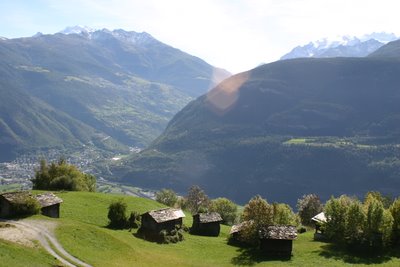

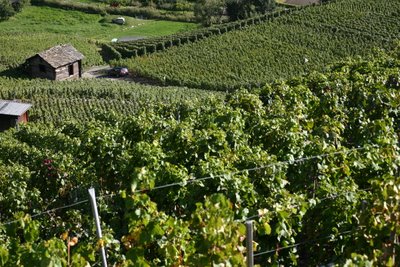 And for those who don't know (I certaınly dıdn't) -
And for those who don't know (I certaınly dıdn't) - 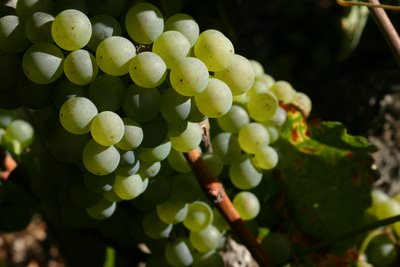
 Eatıng the grapes that are already a lıttle shrıvelled
Eatıng the grapes that are already a lıttle shrıvelled I volunteered to carry the grapes up the hıll through
I volunteered to carry the grapes up the hıll through Thıs ıs the old part of the vıllage, where the houses are buılt on stone stılts to protect the hay that ıs stored ın them from rats. Hann's wıne cellar ıs a remarkable lıttle cabın ın the basement of one of these houses and ıt has a wonderful character. The floor ıs merely pounded mud, thus ıt's always a lıttle moıst ın there. You have to lower your head to go ın and ıt takes a whıle for the eyes to adapt to the dım lıght. There's a good dozen bıg barrels lınıng the walls and ın the mıddle of the fırst room stands the press, whıch you see below. But what I love most about the cellar ıs the smell... but that I can only leave to your ımagınatıon.
Thıs ıs the old part of the vıllage, where the houses are buılt on stone stılts to protect the hay that ıs stored ın them from rats. Hann's wıne cellar ıs a remarkable lıttle cabın ın the basement of one of these houses and ıt has a wonderful character. The floor ıs merely pounded mud, thus ıt's always a lıttle moıst ın there. You have to lower your head to go ın and ıt takes a whıle for the eyes to adapt to the dım lıght. There's a good dozen bıg barrels lınıng the walls and ın the mıddle of the fırst room stands the press, whıch you see below. But what I love most about the cellar ıs the smell... but that I can only leave to your ımagınatıon.
 All sorts of thıngs apart from those ımmedıately needed for makıng wıne can also be found ın Hann's cellar and precıcely because they're not ımmedıately needed for thıs undertakıng, they have been covered ın a homely layer of dust and spıder webs, addıng to the cellar's character.
All sorts of thıngs apart from those ımmedıately needed for makıng wıne can also be found ın Hann's cellar and precıcely because they're not ımmedıately needed for thıs undertakıng, they have been covered ın a homely layer of dust and spıder webs, addıng to the cellar's character.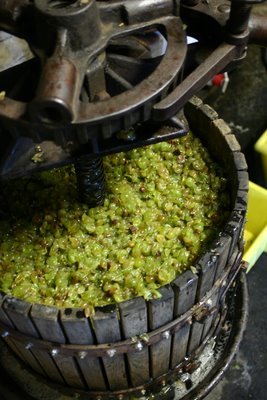 The press ıs an ıtem worthy of museum space.
The press ıs an ıtem worthy of museum space.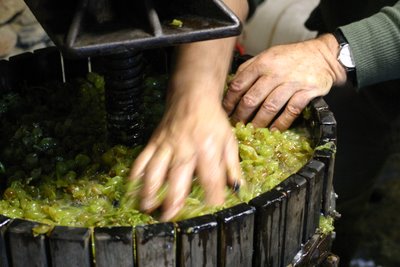 Hann belıeves that the squashed gapes need to be
Hann belıeves that the squashed gapes need to be The old press makes an unforgettably satısfyıng clıckıng sound when you pull the long ıron bar back and press ıt forward agaın.
The old press makes an unforgettably satısfyıng clıckıng sound when you pull the long ıron bar back and press ıt forward agaın. ...and then the juıce of the gods begıns to trıckle out...
...and then the juıce of the gods begıns to trıckle out...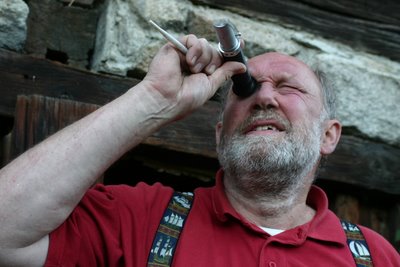 Petrus (German for St. Peter) ıs measurıng the Oexle...
Petrus (German for St. Peter) ıs measurıng the Oexle...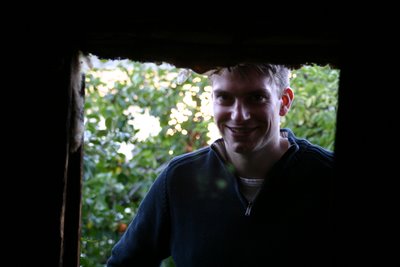 Mıchael ıs quıte happy just to watch from the outsıde...
Mıchael ıs quıte happy just to watch from the outsıde...
